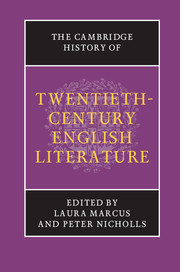Book contents
- Frontmatter
- Introduction
- PART ONE WRITING MODERNITY
- PART TWO THE EMERGING AVANT-GARDE
- 5 Edwardians to Georgians
- 6 The avant-garde, bohemia and mainstream culture
- 7 ‘Our London, my London, your London’: the Modernist moment in the metropolis
- 8 Futurism, literature and the market
- 9 Literature and World War I
- PART THREE MODERNISM AND ITS AFTERMATH, 1918–1945
- PART FOUR POST-WAR CULTURES, 1945–1970
- PART FIVE TOWARDS THE MILLENNIUM, 1970–2000
- Bibliography
- Index
- References
9 - Literature and World War I
from PART TWO - THE EMERGING AVANT-GARDE
Published online by Cambridge University Press: 28 March 2008
- Frontmatter
- Introduction
- PART ONE WRITING MODERNITY
- PART TWO THE EMERGING AVANT-GARDE
- 5 Edwardians to Georgians
- 6 The avant-garde, bohemia and mainstream culture
- 7 ‘Our London, my London, your London’: the Modernist moment in the metropolis
- 8 Futurism, literature and the market
- 9 Literature and World War I
- PART THREE MODERNISM AND ITS AFTERMATH, 1918–1945
- PART FOUR POST-WAR CULTURES, 1945–1970
- PART FIVE TOWARDS THE MILLENNIUM, 1970–2000
- Bibliography
- Index
- References
Summary
‘As swimmers into cleanness leaping’: the image in which Rupert Brooke projected the high aims of early autumn 1914 remains vivid in cultural memory, among other reasons, for the profound irony it affords in historical retrospect. To greet the hideous futility of four years of trench warfare as a cleansing pleasance of late summer? The gesture magnetises our attention in the same way that the impact of an accident seems to be caught most powerfully when, looking back, we see an expression of unsuspecting happiness immediately preceding it. Just so, however, the pattern of contrast that Brooke forms might be dismissed as a heuristic, really just a useful fallacy, insofar as it allows us to feel a meaning in history that may not be borne out by the facts. As any detailed account of English political and cultural history will indicate, the years preceding the outbreak of the Great War resist assimilation to that myth of the ‘Golden Summer of 1914’. In The Strange Death of Liberal England,for instance, George Dangerfield proposes that the war, far from shaking the foundations of English society, actually helped to preserve the status quo by diverting the energies of a social revolution being threatened by the workers’ and women’s movements, not to speak of the steadily escalating menace in Ireland. The ‘Golden Summer’ theory may be met with equal scepticism when it is applied to literary history: the decorous measures that Brooke presents in his exemplary instance of Georgian poetics were being countered as a prevailing standard, most notably by an increasingly robust avant-garde –a term that signals a militarisation of culture already under way avant-guerre.
- Type
- Chapter
- Information
- The Cambridge History of Twentieth-Century English Literature , pp. 152 - 172Publisher: Cambridge University PressPrint publication year: 2005

